Academic Reference Letter Templates: 22-Ready-to-Use Formats for Different Purposes
Welcome to “Academic Reference Letters,” your go-to resource for all things related to academic recommendation letters. Whether you are a student seeking guidance on requesting reference letters or an educator or professional looking for tips on writing impactful letters, you’ve come to the right place. Our website is designed to provide you with valuable information, guidelines, and resources to navigate the reference letter process effectively. From understanding the purpose and importance of different types of reference letters to offering etiquette tips and templates, we are here to support you every step of the way. Prepare to unlock the potential of your reference letters and enhance your chances of success in academic and professional pursuits. Let’s embark on this journey together and make your reference letters shine!
Tips for Requesting Reference Letters
- Choose the Right Referees: Select individuals who are familiar with your academic abilities, skills, and personal qualities. Ideally, choose professors, advisors, or mentors who can speak specifically to your strengths and accomplishments.
- Provide Ample Notice: Reach out to your referees well in advance, preferably several weeks or even months before the deadline. This gives them enough time to write a thoughtful and well-crafted letter.
- Make a Personal Request: Approach your referees in person, if possible, or through a personalized email. Explain why you value their opinion and why you believe they would be the ideal person to write a reference letter for you.
- Share Relevant Information: Provide your referees with essential details such as the purpose of the reference letter, the specific program or opportunity you’re applying for, and any specific points you would like them to highlight.
- Offer Supporting Documents: If you have a resume, academic transcripts, or any other relevant documents, offer to provide them to your referees. These materials can assist them in writing a comprehensive and accurate reference letter.
- Be Polite and Grateful: Express your gratitude for their willingness to write a reference letter on your behalf. Remember to thank them sincerely, both when you request the letter and after they have submitted it. A handwritten note or email expressing your appreciation can go a long way.
- Follow Up and Provide Updates: If you receive any positive news or updates regarding your application or achievements, keep your referees informed. They may wish to incorporate this new information into their letter or provide additional support if needed.
- Stay Professional and Respectful: Remember that your referees are taking time out of their busy schedules to support you. Be professional, prompt, and respectful in all your communications, and always adhere to any guidelines or deadlines they provide.
Be Polite and Grateful
When requesting a reference letter, it is crucial to be polite and grateful for the writer’s willingness to support you. Express your heartfelt gratitude for their time and effort in writing the letter on your behalf. Whether you choose to thank them in person, through a handwritten note, or via email, make sure your appreciation is sincere and genuine. Acknowledge the value of their support and the impact their letter will have on your academic or professional pursuits. Additionally, remember to extend your gratitude once again after they have submitted the reference letter. A simple follow-up message expressing your appreciation for their contribution can go a long way in maintaining a positive and professional relationship.
#1: Professor’s Reference:
A Professor’s Reference Letter is a valuable document that a professor writes to support a student’s application for academic or professional endeavors. Its purpose is to provide an honest assessment of the abilities and potential based on personal experience with them. Think of it as a strong vote of confidence, highlighting the academic achievements, research skills, work ethic, and other important qualities that make them excellent candidates. This letter holds a lot of weight and can greatly influence the decision-maker’s opinion of the student, ultimately helping them stand out from the competition.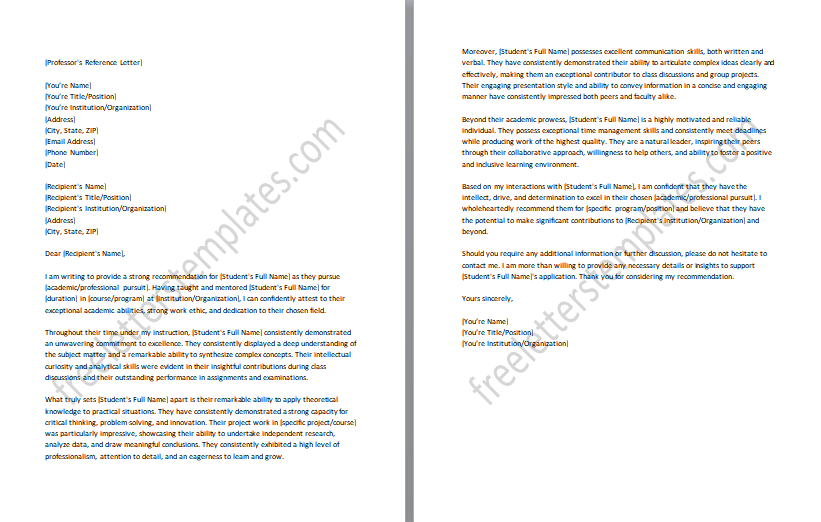
#2: Research Supervisors:
A Research Supervisor’s Reference Letter is a powerful endorsement written by a research supervisor to vouch for a student’s skills and potential. It’s like a personal recommendation straight from the supervisor’s heart. This letter shines a spotlight on the remarkable accomplishments within the research realm, showcasing their dedication, inquisitiveness, and valuable contributions to the field. Its main purpose is to support the student’s applications for exciting future opportunities, such as advanced positions, graduate studies, or even landing a dream job in a research-oriented field. This is truly influential as it carries the weight of the supervisor’s firsthand experience and expertise, adding credibility and authority to the student’s abilities and prospects.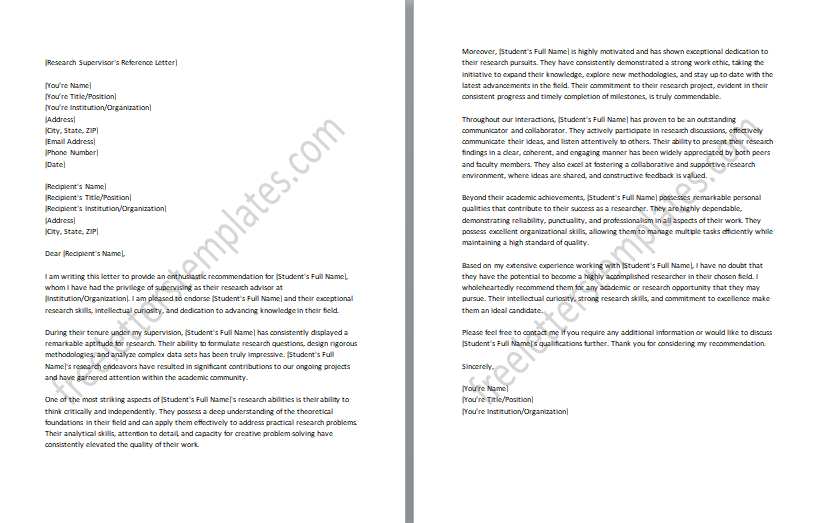
#3: Admissions Reference:
An Admissions Reference Letter is like a supportive recommendation written by an academic institution to back a student’s application for admission. It’s a special gesture that goes beyond the usual application materials. This letter aims to shed more light on the accomplishments, unique qualities, and potential for success in their chosen program. The Admissions Reference holds a lot of weight in the decision-making process, as it helps the committee see the student more holistically. It’s like having someone from the institution cheering for the acceptance and believing in their potential to thrive there.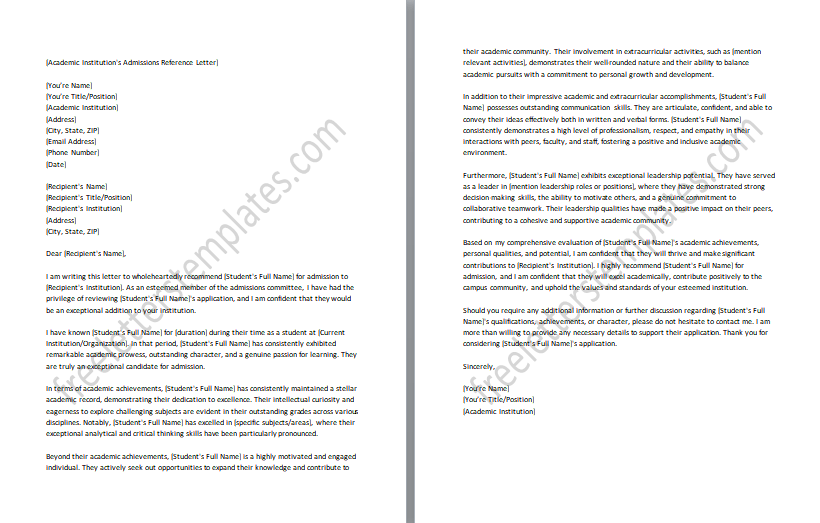
#4: Scholarship Reference:
A Scholarship Reference Letter is a heartfelt endorsement written on behalf of a student, supporting their application for a scholarship. This letter holds the power to make a significant impact on the selection committee. Its purpose is to highlight the student’s outstanding academic achievements, exceptional talents, and unique qualities that make them a deserving candidate for the scholarship. It provides valuable insights into the student’s character, work ethic, and passion, demonstrating why they are the ideal recipient for the opportunity. The Letter is an essential component of the application package, as it helps the committee understand the accomplishments beyond their academic transcript and serves as a compelling testament to the worthiness of the scholarship.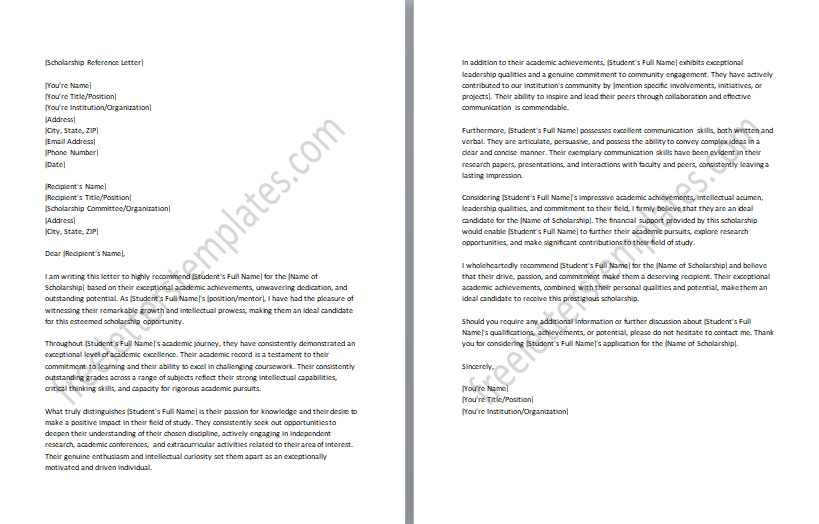
#5: Teaching Assistant:
A Teaching Assistant Reference Letter is a sincere recommendation written by a professor or faculty member in support of a student’s application for future positions. Its purpose is to highlight the student’s teaching skills, interpersonal abilities, and commitment to fostering a positive learning environment. The reference serves as a strong endorsement, showcasing the ability to effectively communicate complex concepts, provide guidance and contribute to the overall success of the classroom. It also provides insights into reliability, professionalism, and adaptability in various educational settings. The Teaching Assistant Reference carries significant weight in the evaluation process, as it provides valuable evidence of the student’s aptitude for teaching and their potential to excel in future roles.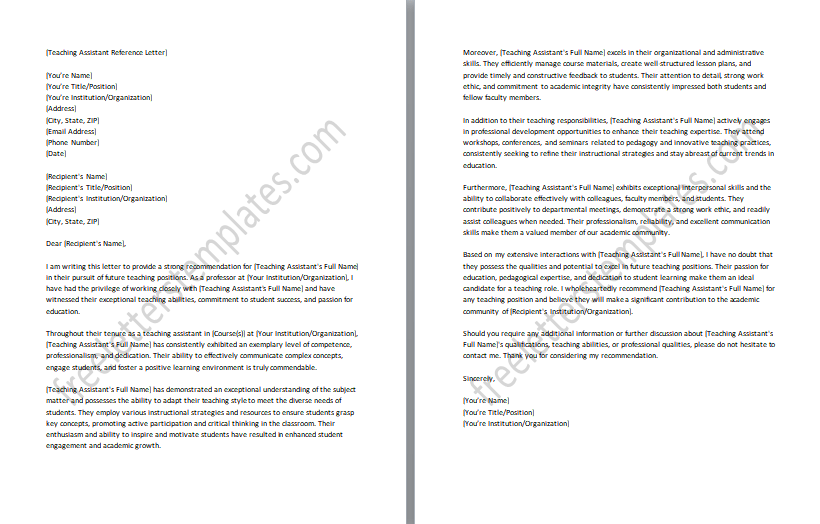
#6: Internship Reference:
An Internship Reference Letter is a thoughtful recommendation written by an employer or supervisor to support a student’s application for an opportunity. This letter serves as a powerful endorsement, highlighting the student’s skills, qualifications, and potential as an intern. Its purpose is to provide insights into the work ethic, professionalism, and ability to contribute meaningfully to the internship role. The letter showcases the achievements, responsibilities, and positive impact they made during their previous internship or work experiences. The Internship Reference plays a vital role in the selection process, helping prospective employers gain a better understanding of the capabilities and suitability for the opportunity.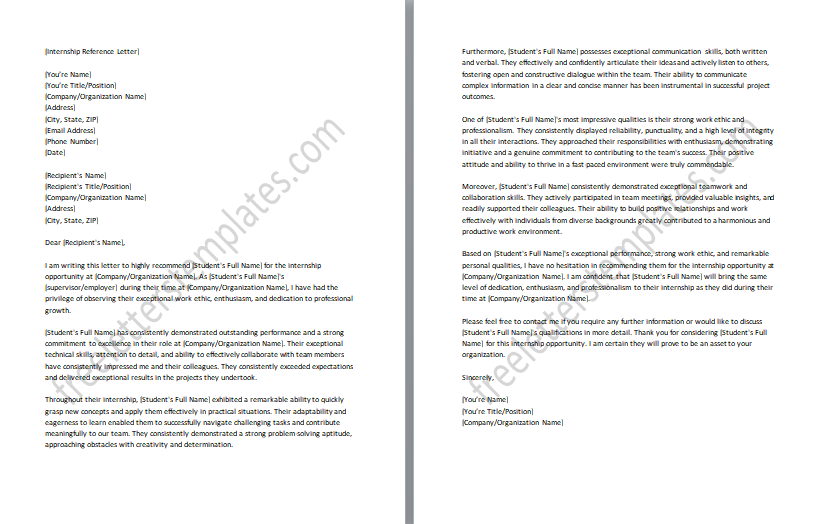
#7: Graduate School:
A Graduate School Reference Letter is like a heartfelt recommendation letter written by a professor or academic advisor to support a student’s application for school. It’s a document filled with genuine admiration and support for the student’s academic journey. This letter holds incredible value as it sheds light on the student’s achievements, research skills, and potential for advanced studies. The reference proudly displays the student’s academic accomplishments and research experience, emphasizing their ability to make meaningful contributions to the graduate program. It also provides an honest evaluation of the student’s potential for independent research and their perfect fit within the program’s objectives. The Graduate School Reference is a true game-changer in the application process, as it gives the admissions committee a personal and heartfelt insight into the student’s qualifications and their promising future in their chosen field. It’s a powerful endorsement that can greatly increase the chances of securing a spot in the program they aspire to join.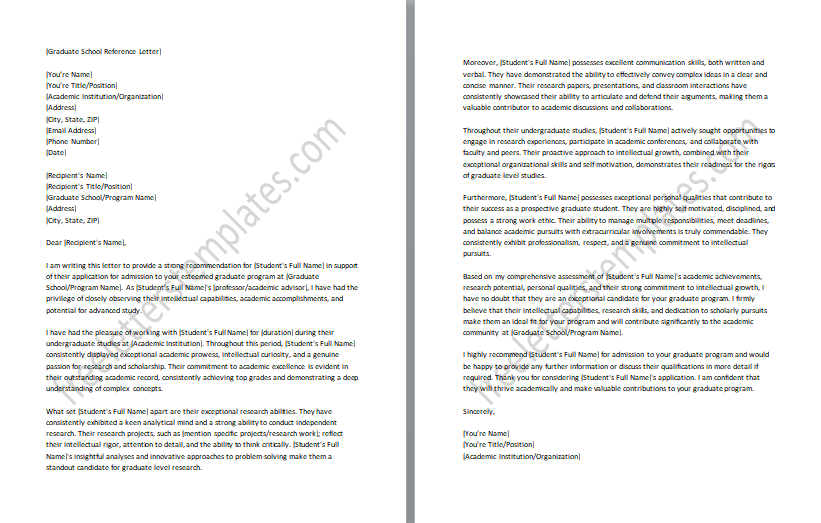
#8: Postdoctoral Reference:
A Postdoctoral Reference Letter is a genuine recommendation written by a research advisor or mentor to endorse a candidate for a research position. This letter holds immense importance as it provides valuable insights into the candidate’s research capabilities, expertise, and potential for independent research. The reference serves as a strong endorsement, showcasing the candidate’s innovative thinking, technical skills, and ability to drive impactful research projects. It also emphasizes their professional qualities, such as their work ethic, collaboration skills, and leadership potential. The Postdoctoral Reference Letter plays a vital role in the selection process, providing the hiring committee with a comprehensive evaluation of the candidate’s research abilities and their potential to make valuable contributions to the research team. It serves as a compelling testimony to the candidate’s expertise and sets them apart from other applicants vying for the same position.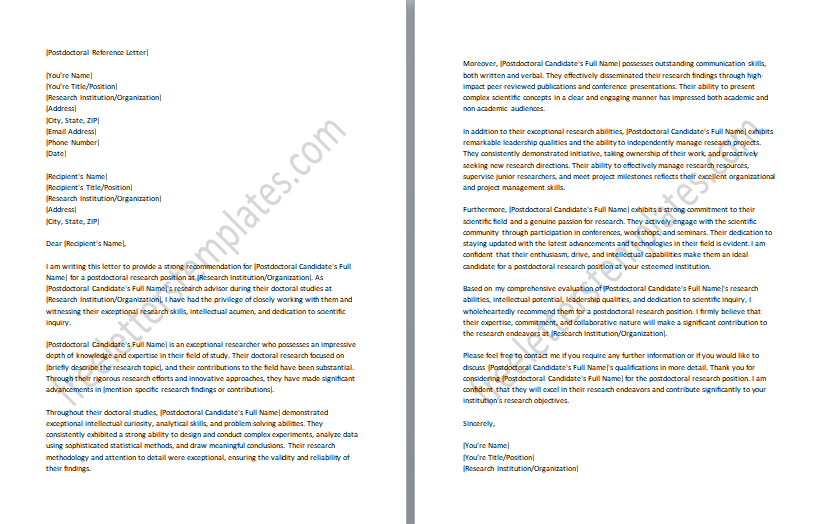
#9: Tenure Promotion Letter:
A Tenure Promotion Reference Letter is a heartfelt recommendation written on behalf of a faculty member to support their application for tenure and promotion. This letter holds immense significance as it provides a comprehensive evaluation of the faculty member’s teaching, research, and service contributions to the academic institution. The letter showcases the faculty member’s teaching effectiveness, research excellence, and active involvement in service activities. It also emphasizes their leadership skills, collegiality, and contributions to the academic community. The Tenure Promotion Reference plays a crucial role in the evaluation process, providing the committee with a deep understanding of the faculty member’s qualifications, impact, and potential for continued success. It serves as a powerful endorsement, recognizing the faculty member’s significant contributions and affirming their suitability for promotion.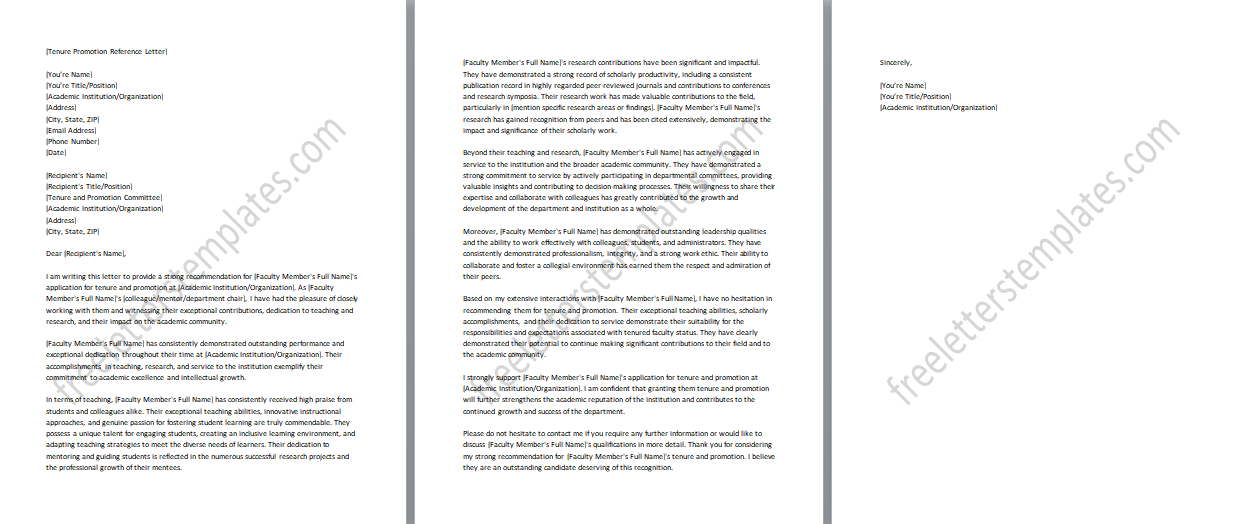
#10: Job Application Reference:
A Job Application Reference Letter is a sincere recommendation written by a professor or academic advisor to endorse a student’s application for a job in their field of study. This letter serves as a strong vote of confidence, highlighting the student’s qualifications, skills, and potential as a professional in their chosen field. The reference letter showcases the student’s academic achievements, relevant coursework, practical skills, and any industry experience or internships they may have completed. The Job Application Reference carries significant weight in the hiring process, as it provides additional evidence of the student’s qualifications and serves as a valuable endorsement from a respected academic source. It can greatly enhance the student’s chances of securing the desired job opportunity by highlighting their strengths and potential contributions to the employer.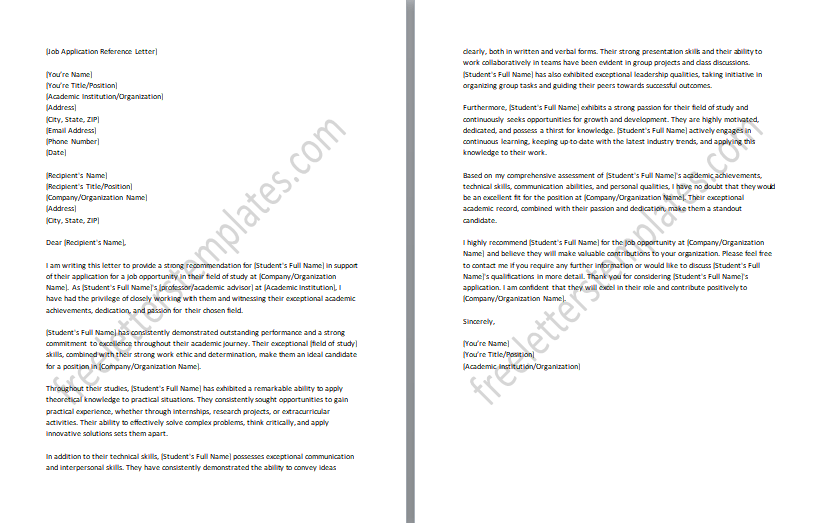
#11: Study Abroad Letter:
A Study Abroad Reference Letter is a heartfelt recommendation written by a professor or academic advisor to support a student’s application for a study abroad program. Its purpose is to highlight the student’s enthusiasm for cultural immersion, adaptability, and ability to thrive in a different academic and cultural environment. The reference letter showcases the student’s academic achievements, intellectual curiosity, and their commitment to embracing new experiences and perspectives. The Study Abroad Reference Letter plays a crucial role in the application process, helping the program evaluate the student’s qualifications and potential fit within the program. It serves as a powerful endorsement, demonstrating the student’s readiness and potential for growth through the experience. It encourages the program to select the student, believing they will make the most of this opportunity to broaden their horizons, develop intercultural competence, and contribute positively to the global community.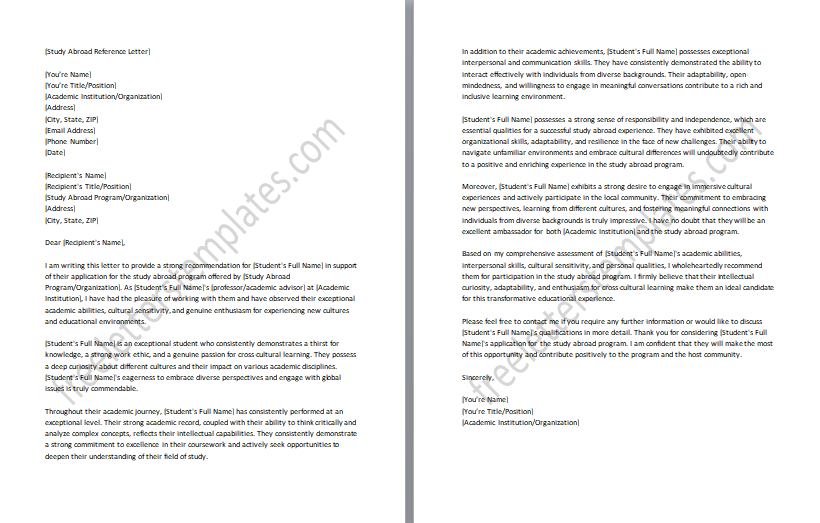
#12: Academic Honors Reference:
An Academic Honors Reference Letter is a glowing endorsement written on behalf of a student, supporting their application for academic honors and awards. This letter holds immense significance as it provides a comprehensive evaluation of the student’s achievements, personal qualities, and potential for continued success. The reference showcases the student’s outstanding grades, participation in research projects or extracurricular activities, and their positive impact on the academic community. It also emphasizes their leadership skills, critical thinking abilities, and commitment to excellence. The Honors Reference plays a vital role in the selection process, helping the honors committee gain a deeper understanding of the student’s qualifications and their potential to excel in their pursuits. It serves as a powerful endorsement, recognizing the student’s exceptional achievements and affirming their deservingness of honors and awards.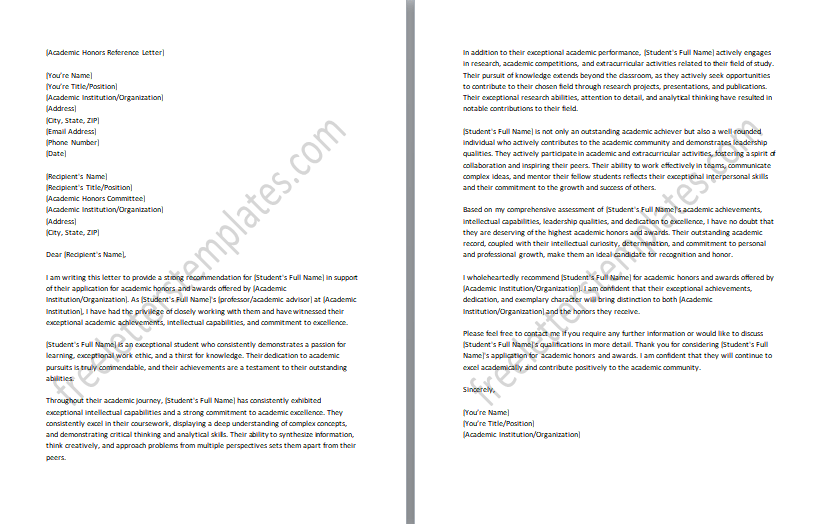
#13: Graduate Teaching Letter:
A Graduate Teaching Reference Letter is a heartfelt recommendation written by a professor or faculty member in support of a graduate student’s application for a teaching position. This letter holds significant importance as it provides insights into my teaching abilities, passion for education, and potential as a future educator. The reference letter showcases the student’s teaching effectiveness, their ability to communicate complex concepts, and their dedication to learning and development. It also emphasizes their organization, adaptability, and their commitment to staying abreast of the latest educational practices and technologies. The Graduate Teaching Reference plays a crucial role in the selection process, providing evidence of the student’s ability to excel in a teaching role and contribute positively to the academic institution. It serves as a strong endorsement, showcasing the student’s potential as an effective and inspiring educator.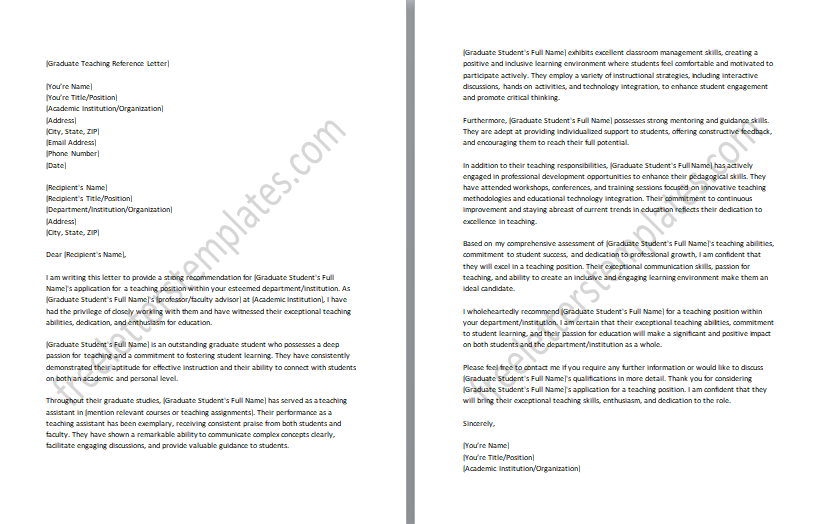
#14: Research Grant Reference:
A Research Grant Reference Letter is a compelling recommendation written by a professor or research mentor to support a student’s application for a research grant. This letter carries significant weight as it provides valuable insights into the student’s capabilities, potential, and significance of their proposed project. The reference letter showcases the research achievements, intellectual curiosity, and dedication to advancing knowledge in their field. It also emphasizes the importance and impact of the proposed project, highlighting its relevance to the broader academic community. The Research Grant Reference plays a critical role in the grant application process, helping the selection committee assess the student’s qualifications, potential, and feasibility of the proposed project. It serves as a persuasive endorsement, providing evidence of the student’s competence, commitment, and potential to make significant contributions to their field of study through the grant.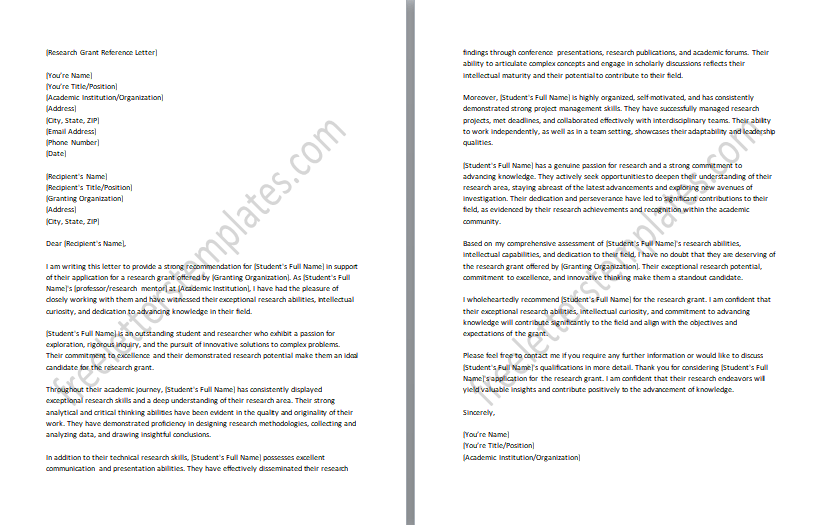
#15: Academic Conference Presentation Reference:
An Academic Conference Presentation Reference Letter is an enthusiastic endorsement written by a professor or academic advisor to support a student’s application to present their research at a conference. It also highlights the student’s presentation skills, their ability to engage and inspire an audience, and their potential to foster discussions and collaborations. The Academic Conference Presentation Reference Letter plays a crucial role in the selection process, helping the conference organizers assess the qualifications, the relevance of their research to the conference theme, and their potential to contribute to the overall conference program. It serves as a compelling endorsement, supporting the student’s application and increasing their chances of being selected to present their research at the prestigious conference.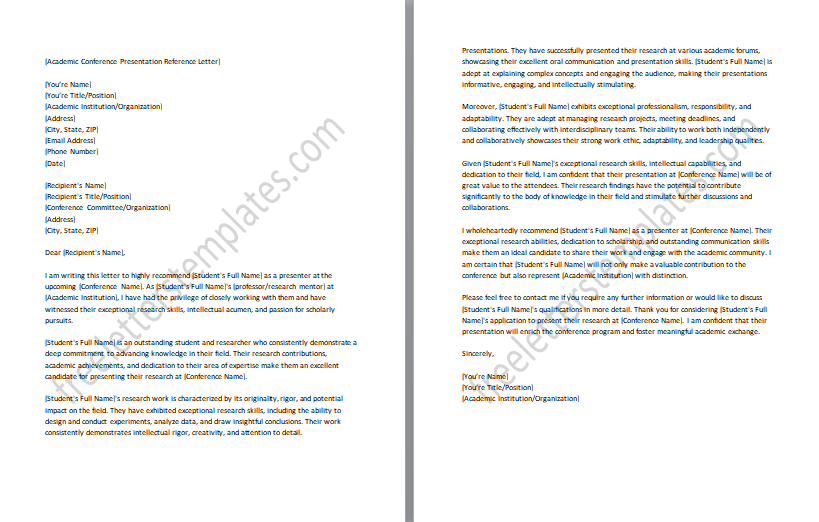
#16: Academic Publication Reference:
An Academic Publication Reference Letter is a compelling recommendation written by a professor or academic advisor to endorse a student’s research publication for academic recognition. It highlights the importance, quality, and contribution of the student’s publication to the field. It emphasizes the originality, rigorous methodology, and significance of the findings. The reference letter plays a vital role in assessing the student’s qualifications, research value, and potential impact. It serves as a strong endorsement, enhancing the publication’s credibility and raising the student’s visibility and reputation within their community.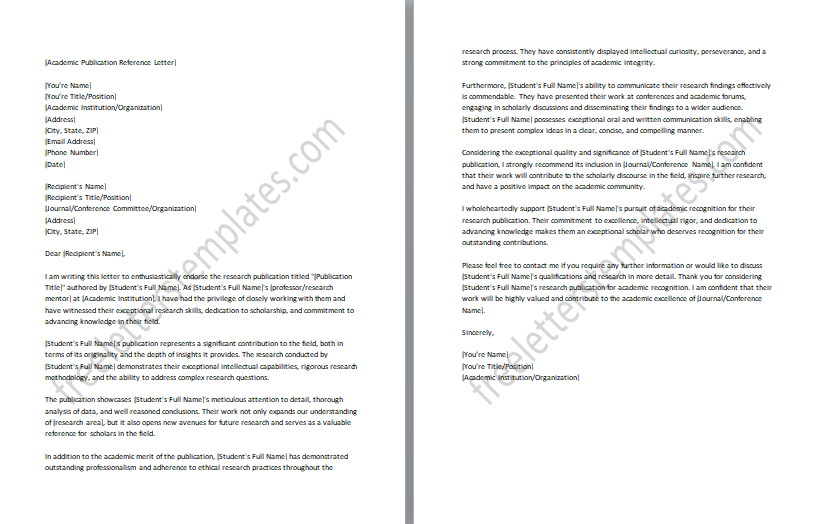
#17: Academic Advising Reference:
An Academic Advising Reference Letter is a heartfelt recommendation written by an academic advisor to endorse a student’s progress, potential, and personal qualities. This letter holds immense significance as it provides a comprehensive evaluation of the student’s achievements, growth, and ability to navigate their educational journey successfully. Its purpose is to highlight the advisor’s observations of the student’s intellectual curiosity, dedication to learning, and proactive approach to planning. The letter showcases the student’s performance, their ability to set and achieve goals, and their involvement in extracurricular activities or leadership roles. The Academic Advising Reference plays a vital role in supporting the student’s academic aspirations, providing evidence of their strengths, and affirming their readiness for future challenges.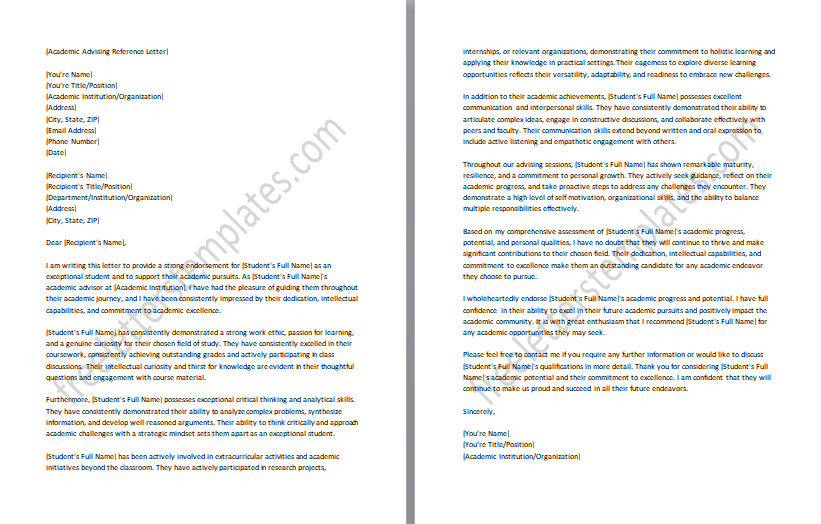
#18: Ph.D. Application Reference:
A Ph.D. An application Reference Letter is a persuasive recommendation written by a professor or academic mentor to support a student’s Ph.D. program application. It highlights the student’s academic abilities, research potential, and suitability for doctoral studies. The letter showcases their achievements, research experience, and critical thinking skills. It emphasizes their motivation, perseverance, and collaborative nature. The letter assists the admissions committee in evaluating the student’s qualifications, research fit, and potential for success in the program. It serves as a strong endorsement, indicating the student’s readiness and potential to excel as a doctoral candidate, contributing to their field’s advancement.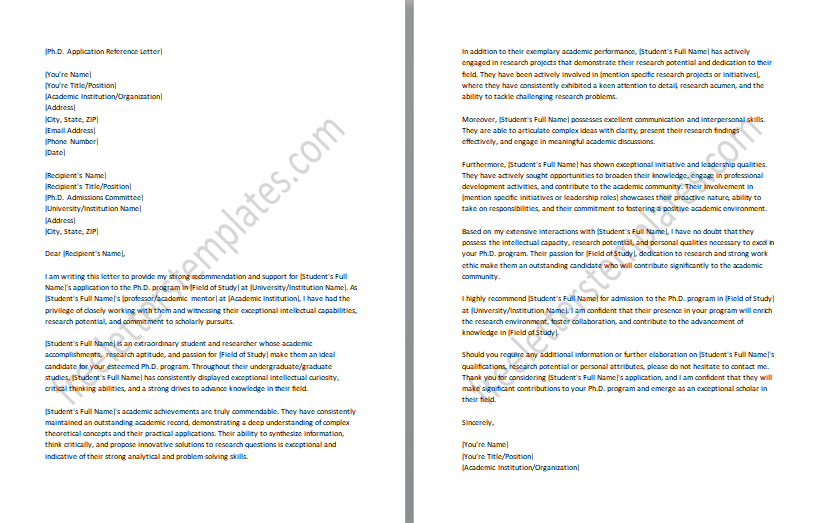
#19: Summer Research Program:
A Summer Research Program Reference Letter is a strong recommendation written by a professor or research advisor to support a student’s application for a summer research program. This letter plays a significant role in showcasing the student’s research abilities, academic potential, and suitability for the program. It highlights the student’s previous research experience, technical skills, and dedication to scholarly inquiry. The letter emphasizes their intellectual curiosity, critical thinking skills, and their ability to work independently or as part of a research team. It also showcases their commitment to personal and professional growth, as well as their potential to contribute meaningfully to the research program. The Summer Research serves as a persuasive endorsement, demonstrating the student’s qualifications and readiness to participate in a rigorous and immersive research experience during the summer.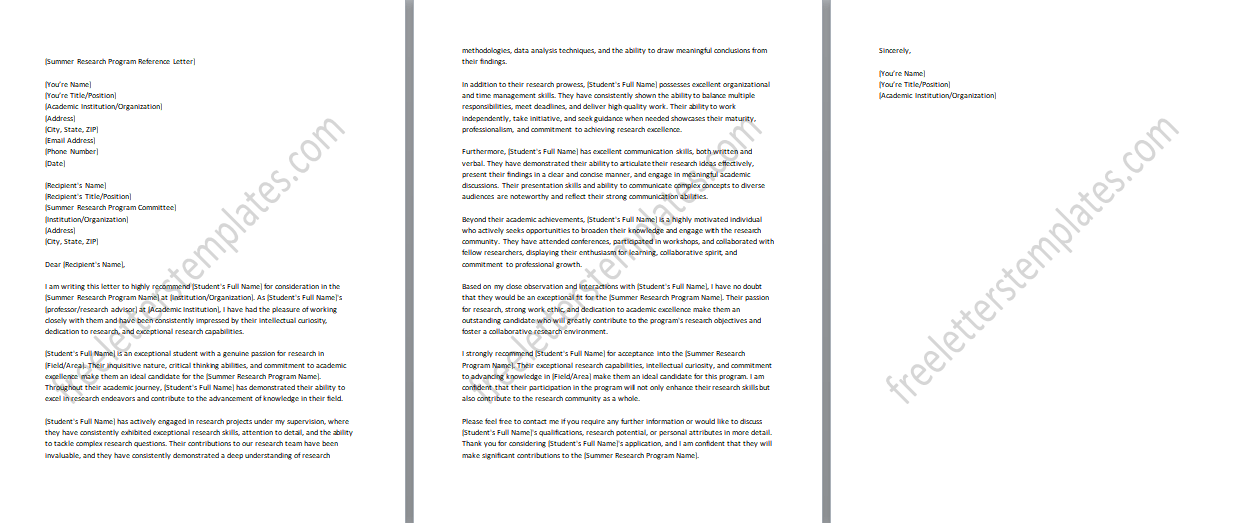
#20: Study Group Reference:
A Study Group Reference Letter is a supportive recommendation written to endorse a student’s participation in a study group or academic collaboration. This letter plays a valuable role in highlighting the student’s collaborative skills, academic engagement, and dedication to shared learning experiences. The reference letter highlights the student’s reliability, teamwork, and willingness to help others in their academic endeavors. It also showcases their adaptability, openness to diverse perspectives, and their ability to foster a positive and productive group dynamic. The Study Group Reference serves as a strong endorsement, affirming the student’s ability to contribute to collaborative learning environments and benefit from the collective wisdom of their peers.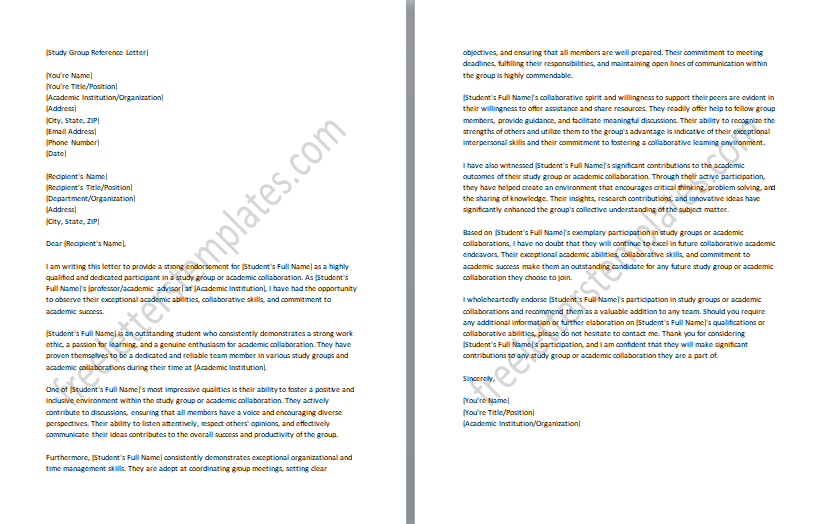
#21: Academic Award Nomination Reference:
An Academic Award Nomination Reference Letter is a compelling recommendation written to nominate a student for an academic award, recognizing their outstanding achievements and contributions. It emphasizes their intellectual abilities, passion for learning, and dedication to their field of study. The letter showcases the student’s specific accomplishments, research projects, scholarly publications, or notable contributions to academic organizations or initiatives. The Academic Award Nomination Reference serves as a persuasive endorsement, advocating for the student’s recognition and celebrating their remarkable achievements, setting them apart as deserving candidates for the prestigious academic award.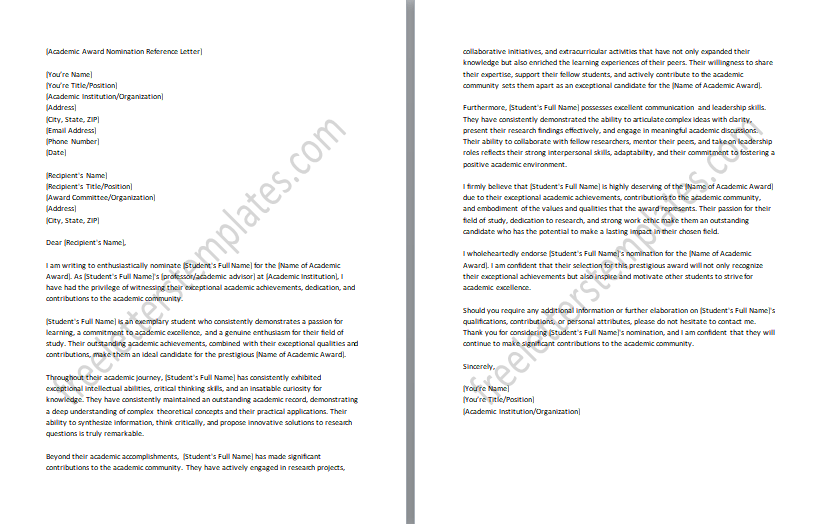
#22: Leadership Program:
A Leadership Program Reference Letter is a compelling recommendation written to support a student’s application for a leadership program or opportunity. The reference letter highlights the student’s previous leadership experiences, their ability to collaborate effectively, and their commitment to personal growth and development. It also showcases their resilience, adaptability, and their passion for creating positive change. The Leadership Program Letter serves as a persuasive endorsement, supporting the student’s application and demonstrating their readiness and potential to thrive in a leadership role, making a meaningful difference in their chosen field or organization.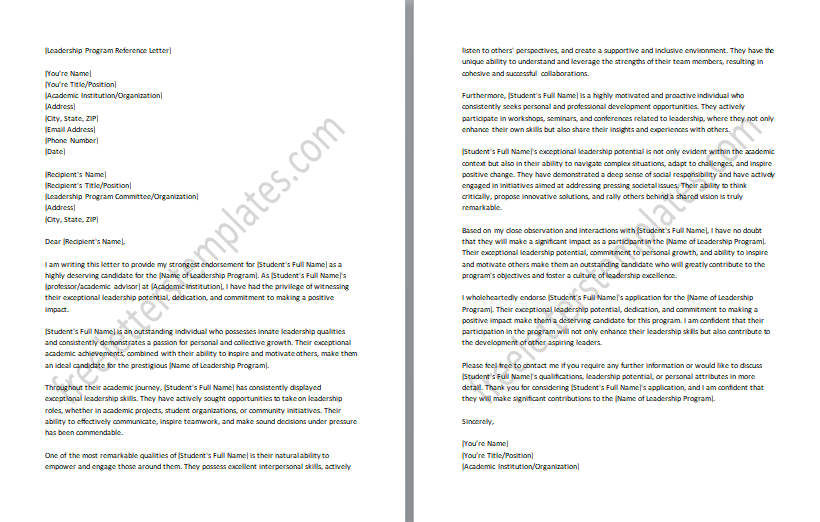
Guidelines for Writing Reference Letters
- Introduction:
- Start with a professional salutation and introduce yourself as the writer of the reference letter.
- State your position and relationship to the student (e.g., professor, advisor, employer).
- Opening Paragraph:
- Provide a brief overview of your connection to the student and how long you have known them.
- Express your willingness to write the reference letter and your confidence in the student’s abilities.
- Body Paragraphs:
- Highlight the student’s academic achievements, skills, and qualifications relevant to the purpose of the reference letter.
- Provide specific examples or anecdotes that showcase the student’s strengths, such as exceptional performance in coursework, research projects, or extracurricular activities.
- Discuss the student’s personal qualities, such as their work ethic, leadership abilities, critical thinking skills, or teamwork capabilities.
- Include information about the student’s character, integrity, and their ability to handle challenges and setbacks.
- Supporting Evidence:
- Back your statements with concrete evidence, such as grades, awards, research publications, or notable accomplishments.
- Mention any unique contributions the student has made to the academic community, research projects, or other relevant areas.
- Professional Tone:
- Maintain a professional tone throughout the letter, using appropriate language and avoiding overly casual or informal language.
- Emphasize the student’s strengths and accomplishments while remaining objective and honest in your assessment.
- Conclusion:
- Summarize your overall assessment of the student, emphasizing their potential for future success in their chosen field or program.
- Offer a strong endorsement, recommending the student without reservation.
- Provide your contact information and availability to answer any further questions if needed.
- Proofread and Edit:
- Ensure that the letter is well-organized, coherent, and free of grammatical and spelling errors.
- Read the letter multiple times to catch any inconsistencies or areas that need clarification.
- Consider seeking feedback from colleagues or mentors to ensure the letter effectively highlights the student’s qualifications.
Etiquette and Professionalism
- Requesting Reference Letters:
- Plan ahead and request reference letters well in advance of the deadline, allowing sufficient time for the writer to prepare.
- Ask politely and provide all necessary information, including details about the opportunity you are applying for and any specific points you would like them to highlight.
- Respect the writer’s decision if they are unable to write the reference letter due to time constraints or lack of familiarity with your work.
- Providing Materials:
- Offer to provide supporting materials such as your resume, transcript, or a summary of your accomplishments to assist the writer in preparing a comprehensive reference letter.
- Clearly communicate any specific requirements or guidelines provided by the organization or institution you are applying to.
- Expressing Gratitude:
- Thank the writer sincerely for agreeing to write the reference letter on your behalf. Express your appreciation for their time and effort.
- Consider sending a handwritten note or a personalized email to show your gratitude. Be specific about what you found valuable in their letter.
- Follow-Up:
- Keep the writer informed about the status of your application and any outcomes or achievements related to the opportunity for which they provided the reference.
- If you receive positive news or are awarded the opportunity, promptly inform the writer and express your gratitude for their contribution to your success.
- Professional Conduct:
- Maintain professionalism in all interactions related to the reference letter process. Be prompt, respectful, and courteous in your communication.
- Respond promptly to any requests for additional information or clarification from the writer.
- If you encounter any issues or concerns, address them respectfully and directly with the writer, seeking a resolution in a professional manner.
- Maintaining Relationships:
- Cultivate and maintain professional relationships with your reference letter writers beyond the immediate request. Stay connected, update them on your academic and professional progress, and express your continued appreciation for their support.
Concluding Thoughts
In conclusion, Academic Reference Letters play a vital role in supporting students’ applications for various academic pursuits and opportunities. These letters provide a comprehensive assessment of students’ qualifications, skills, and potential, helping selection committees and decision-makers make informed choices. Whether it is for admission to a prestigious institution, scholarship applications, job opportunities, or other academic endeavors, well-crafted reference letters can significantly enhance students’ chances of success. By offering guidelines for requesting, writing, and acknowledging reference letters, as well as emphasizing professional etiquette and gratitude, this website aims to empower students and individuals involved in the reference letter process. It is our hope that these resources will serve as valuable tools to navigate the world of academic reference letters and foster strong professional relationships in the academic community.